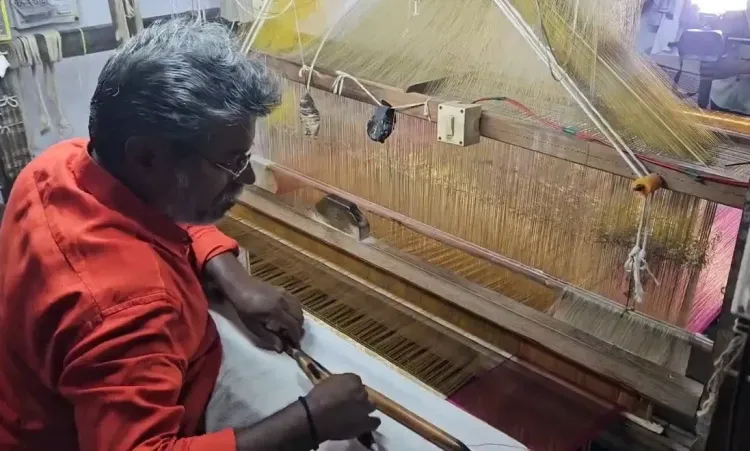Could the India-UK FTA Revitalize Kanchipuram Silk Weavers' Businesses?

Synopsis
Key Takeaways
- Kanchipuram is a vital hub for handloom silk production.
- The India-UK FTA may rejuvenate the local silk industry.
- Weavers are facing challenges from power-loom sarees.
- Increasing prices of gold and silver are affecting incomes.
- Government action is sought to stabilize gold and silver prices.
Chennai, July 30 (NationPress) Kanchipuram, a significant pilgrimage destination in Tamil Nadu, is eagerly looking forward to positive impacts stemming from the Free Trade Agreement (FTA) established between India and the United Kingdom.
This culturally rich town, home to approximately a thousand temples, is proud of its community of over 6,000 handloom weavers primarily located in neighborhoods like Pillayar Palayam and Ayyampettai.
These artisans market their exquisite sarees to private enterprises and cooperative societies. However, the proliferation of ‘power-loom sarees’ masquerading as authentic Kanchi silk sarees has adversely affected the livelihoods of the true Kanchi silk saree weavers.
The recent spike in gold and silver prices has further compounded their difficulties, leading to reduced sales and adversely impacting their earnings. In response to these challenges, the weavers are calling for government intervention to regulate gold and silver prices, aiming to alleviate their financial strain.
Despite these hurdles, the India-UK agreement emerges as a beacon of hope, as weavers anticipate it will enhance silk production and open up more avenues for their craft. This deal has the potential to not only increase production but also enhance exports, thereby benefiting local weavers.
Mohan, a local silk saree producer, expressed optimism about this agreement, viewing it as a significant opportunity for industry growth.
In summary, the Kanchipuram silk sector needs robust support to navigate its current challenges and to seize opportunities presented by the India-UK FTA.
The FTA, formally known as the Comprehensive Economic and Trade Agreement (CETA), is projected to substantially boost jewellery exports from India, as reported by industry experts.
Importantly, the FTA was established to strengthen economic connections between both nations, aiming to enhance trade by lowering tariffs, simplifying customs procedures, and fostering collaboration across diverse sectors.







